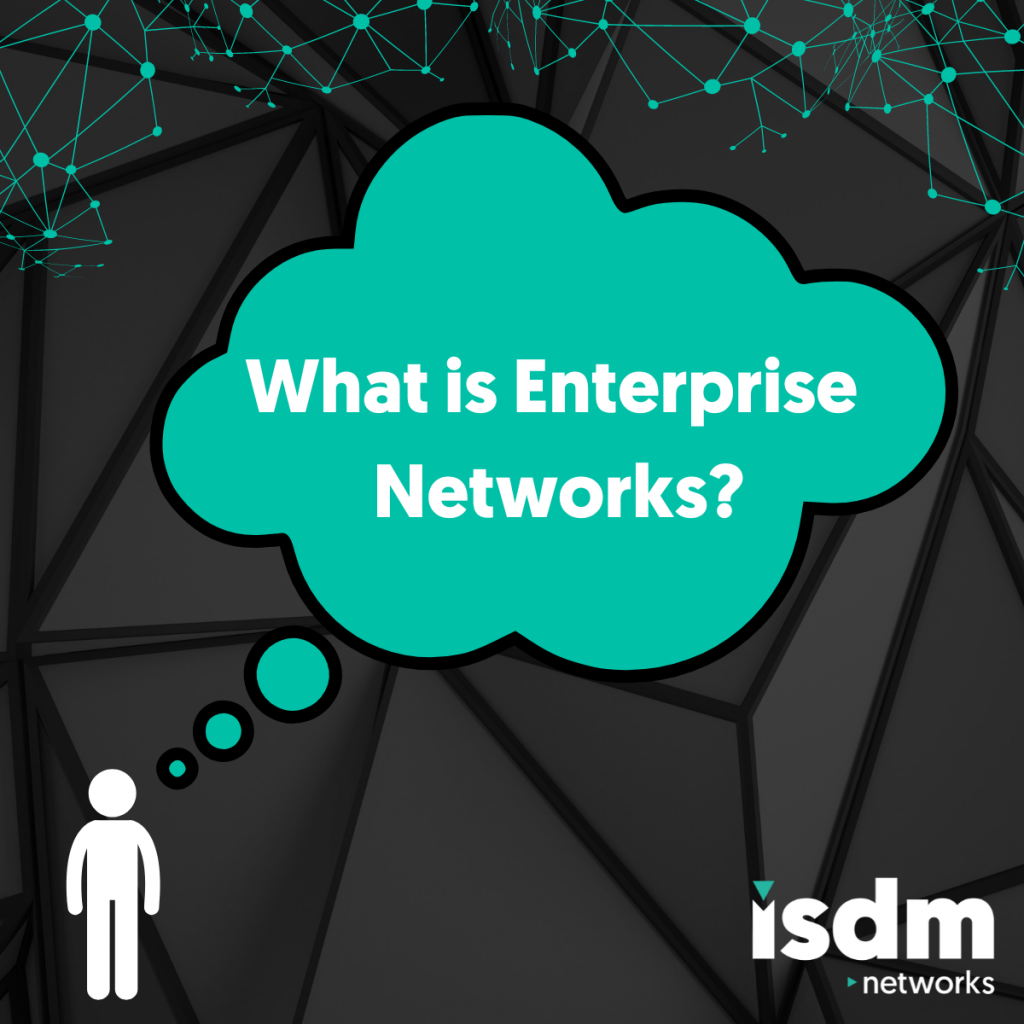What is Enterprise Networks Within a Business?
Enterprise networks is the communications backbone to any business, creating connections between computer devices among the company’s workforce and department’s networks. It is one of the pillars that help support evolving and existing applications and databases.
The enterprise network infrastructure enables systems and apps to:
- Communicate
- Share Information
- Run services and programs
- Analyse system performance
In this blog, we will explore the significance of enterprise networks, their contributions to business operations, and established industry best practices for maintaining secure, high-performance, and exceptionally reliable enterprise networking systems.

Advantages of an Optimised Enterprise Network
In today’s fast-paced business landscape, where connectivity is the core of operations, having an optimised enterprise network is more crucial than ever. From ensuring always-on connectivity to paving the way for digital transformation, a well-optimised network can be a game-changer for organisations.
Optimised User Experience
User experience is at the forefront of a well-optimised enterprise network. With reduced latency, faster data transfer speeds, and minimal downtime, employees can work more efficiently. A smooth and responsive network enhances collaboration tools, video conferencing, and other essential applications, contributing to a positive and productive work environment.
Enhanced Security
This article by AAG highlights that cyber-attacks globally increased by 125% in 2021 compared to 2020, and increasing volumes of cyber-attacks continued to threaten businesses and individuals in 2022.
In an era of increasing cyber threats, security is a top priority for business. An optimised enterprise network includes robust security measures, such as firewalls, intrusion detection systems, and encryption protocols. These layers of protection safeguard sensitive data and ensure compliance with industry regulations, providing peace of mind for both businesses and their clients.
Always-on Connectivity
In a world that never sleeps, the importance of always-on connectivity cannot be overstated. An optimised enterprise network ensures seamless and reliable access to critical resources, allowing employees to collaborate efficiently, irrespective of their location. This constant connectivity lays the foundation for uninterrupted workflows boosting productivity and responsiveness.
Seamless Cloud Integration
An optimised enterprise network seamlessly integrates with cloud services, providing organisations with the agility and scalability needed to thrive in today’s competitive landscape. This integration facilitates efficient data storage, backup, and access from anywhere in the world.
Downsides of not Incorporating Enterprise Networks into your Business
Not incorporating enterprise networks into your business can have several downsides, as modern businesses heavily rely on technology and connectivity for their operations. Here are some potential drawbacks:
Security Concerns
Enterprise networks often include security measures to protect sensitive data and systems. Without a secure network infrastructure, your business becomes more susceptible to cybersecurity threats such as data breaches, malware attacks, and unauthorised access. This can lead to financial losses and damage to your company’s reputation.
Reduced Customer Experience
Enterprise networks are integral to customer relationship management (CRM) systems and other tools that enhance the customer experience. Without a connected infrastructure, providing seamless customer support, managing customer data, and delivering personalised services can be challenging.
Ineffective IT Management
Enterprise networks provide a framework for IT management, including network monitoring, troubleshooting, and updates. Without proper network infrastructure, managing IT resources becomes more complex, leading to potential downtime, increased maintenance costs, and difficulty in implementing new technologies.
Cisco states that 29% of IT leaders and network strategists in Europe who were surveyed recognise troubleshooting networking issues as the most resource-intensive and time-consuming for network operations. Therefore, having effective IT management is a huge factor in keeping enterprise networks running smoothly for future businesses.
Limited Communication and Collaboration
Enterprise networks facilitate communication and collaboration among employees, departments, and even remote teams. Without a robust network infrastructure, your organisation may face challenges in sharing information, coordinating tasks, and working on projects efficiently.
Trends in Enterprise Networks
As we plunge deeper into the digital era, the landscape of enterprise networks is undergoing a transformative evolution. From skyrocketing speeds to intelligent automation and revolutionary security models, businesses are embracing cutting-edge trends to stay ahead of the curve.
Global Data states that the global enterprise networking market was estimated to be worth $409.3 billion in 2022. The increasing utilisation of wireless devices, cloud services, IoT, coupled with a rising need for robust enterprise network connectivity due to the growing prevalence of work-from-home and remote working models, is compelling enterprises to enhance and fortify their networking infrastructure through increased investments in network solutions.
Automated and Intelligent Network
Enterprises are shifting towards automated and intelligent networks to streamline operations and boost efficiency. Automation reduces the burden on IT teams by handling routine tasks, minimising errors, and accelerating response times. Intelligent networks leverage machine learning and AI to adapt to changing conditions, optimising performance, and enhancing user experiences.
Higher Speeds
The need for speed has never been more critical. With the increasing demand for data-intensive applications, higher speeds are becoming the norm in enterprise networks. The transition to technologies like 5G and Wi-Fi 6 is paving the way for faster, more reliable connectivity, enabling businesses to handle massive data loads with ease.

Intent-Based Networks
Intent-based networking is revolutionising the way businesses manage their networks. By aligning network policies with business intent, organisations can automate network configuration and management based on desired outcomes. This not only enhances operational efficiency but also reduces the risk of human error in network configurations.
Zero-Trust Networks
In an era where cyber threats are more sophisticated than ever, the Zero-Trust model is gaining prominence. This approach abandons the traditional “trust but verify” mindset and operates on the principle of “never trust, always verify”. Zero-Trust Networks ensure that every user and device is treated as potentially untrusted, adding an extra layer of security to protect against evolving cyber threats.
“The Zero Trust is a security model based on the principle of maintaining strict access controls and not trusting anyone by default; a holistic approach to network security that incorporates a number of different principles and technologies.” – Ludmila Morozova-Buss- Ph.D. in Technology- Researcher, Student at Capitol Technology University
Final Thoughts
In conclusion, enterprise networks are the backbone of modern businesses, shaping the way organisations operate, communicate, and secure their digital assets. The trends discussed highlight the ongoing evolution in the field, emphasising the need for businesses to stay adaptable and embrace innovative solutions. As technology continues to advance, the role of enterprise networks in fostering efficiency, security, and connectivity remains paramount for businesses striving to thrive in the digital landscape.




